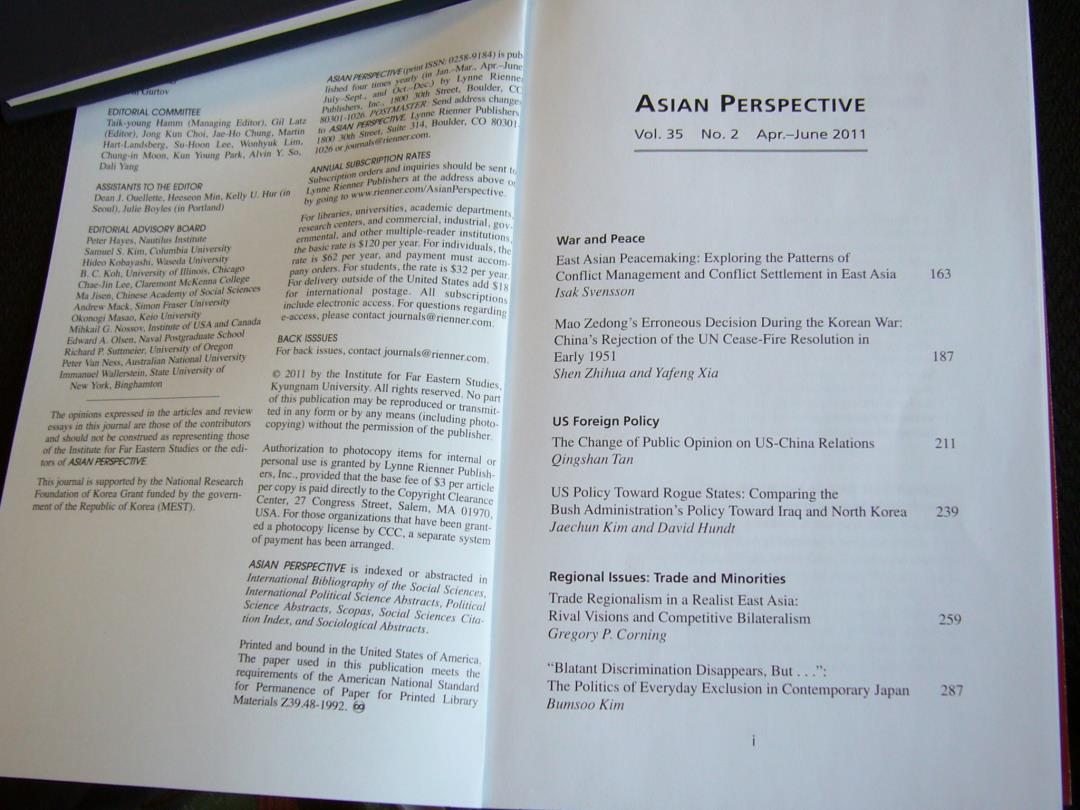
Aar..Apr-June Cuntov Sireet.Boulder.C July-Sept Cet EDITORIAL COMMITTEE 2Send address change Publisher ASIAN PERSPECTIVE Taik-young Hamm (Managing Editor).Cill Lata (Editor).Jong Kun Choi.Jae-Ho Chung.Martin Vol.35 No.2 Apr.-June 2011 Hart-Lamdsbeng.Su-Hoon Lee.Wenhyuk Lim, Chung-in Moon.Kun Young Park.Alvin Y So. Dali Yang ANNLAL SUBSCRIPTION RATES ASSISTANIS TO THE EDITOR Dean J.Ouellette,Heeseon Min.Kelly U.Hur (in headdre above yreAianPerspective Scoul).Julie Boyles (in Portland) em department EDITORAL ADVISORY BOARD revearch centers and commercial,industrial,gov. Peter Hayes、.t aeatal.andgthcgrmultple,cadecrinstituion Samuel S.Kim,Columbia University per year For indivdua the War and Peace Hideo Kobayashi.Wsedany ae peryear and payment mustacc East Asian Peacemaking:Exploring the Patterns of B.C.Koh.University of Illimos,Chicago theaeper yer rdeveryoue of the United Statesadd 1 Conflict Management and Conflict Settlement in East Asia 163 Ma Jisen,Chinese Academty of Social Sciences Andrew Mack.Simon Fraser averiy forinterational postage.All subscriptions Isak Svensson Okonogi Masao,Kelo University neihdceletmmceaccciForqUestionsregaurding please contact journalsrienner.com Mao Zedong's Erroneous Decision During the Korean War: Edward A.Ofsen.Naval Postgraduate School BACK ISSSUES China's Rejection of the UN Cease-Fire Resolution in Richard P Suttmeier,University af Oregon Peter Van Ness,Australian National University For back issues contact joumalsriener com Early 1951 187 Immanoel Wallerstein.State University of Shen Zhihua and Yafeng Xia New York,Binghamtod 2011 by the Institute for Far Eastern Studies. Kyungnam University.All rights reserved.No par The opinions expressed in the articles and review ofthis publication may be reproduced or transmit essayin this joural are those of the contributors ted in any form or by any means(including photo. copying)without the permission of the publisher US Foreign Policy and should not be constnied as representing thase of the Institute for Far Eastem Studies or the edi- naA4N座CTE Authorization to photocopy items for internal or The Change of Public Opinion on US-China Relations 211 personal use is granted by Lynne Rienner Publish. Oingshan Tan This jourl is supported by the National Research es Ine provided that the base fee of 3 perr Foundation of Korea Grant funded by the govern- per copy is paid directly to the Copyright Clearance US Policy Toward Rogue States:Comparing the ment of the Republic of Korea (MEST) Center.27 Congress Street.Salem,MA 01970 USA.For those organizations that have been grant- Bush Administration's Policy Toward Irag and North Korea 239 edphotocopy license by CCC.a separate system Jaechun Kim and David Hundt of payment has been arranged. ASIAN PERSPECTIVE is indexed or abstracted in International Bibliography of the Social Sciences. Regional Issues:Trade and Minorities International Political Science Abstracts.Politicul Science Abstracts,Scopas,Social Sciences Cita- Trade Regionalism in a Realist East Asia: tion Index,and Sociological Abstracts. Rival Visions and Competitive Bilateralism 259 Gregory P.Corning Printed and bound in the United States of America. The paper used in this publication meets the requirements of the American National Standard "Blatant Discrimination Disappears,But.." for Permanence of Paper for Printed Library The Politics of Everyday Exclusion in Contemporary Japan 287 Materials 239.48-1992.69 Bumsoo Kim

Asian Perspective 35(2011)187-209 Mao Zedong's Erroneous Decision During the Korean War: China's Rejection of the UN Cease-fire Resolution in Early 1951 Alinary·revieseed·Original Scho/arshit Shen Zhihua and Yafeng Xia Previous studies of the Korean War have given much attention to the armistice negotiations that started in July 1951.Little has been written of the peacemaking efforts between the time of China's entry into the war in October 1950 and the creation of the United Nations cease-fire resolution in early January 1951.Relying on Chi- nese,Russian,and US archival sources,in particular Mao Zedong's recently published military papers and Chinese foreign ministry archives,this article examines China's views and policies toward the UN resolution.It argues that Mao made an erroneous decision not to accept the UN resolution in January 1951.Because of the mistake, China completely lost its advantage on the Korean battlefield and in Edited by Hvung-Gu Limn the international arena.KErwoRDs:China,Korean War,Mao Zedong. Independently published since 1928 Chinese foreign policy in Korea. Pacific Affairs An Intenational Revie of Aud and the Pacific GETTING INVOLVED IN THE KOREAN WAR WAS THE PEOPLE'S REPUBLIC OF China's(PRC)first attempt to participate in managing international There are few names among academic journals focused on Asia as rich in historyand as evocative affairs and resolving crises on its periphery.But sixty years later.the as Pacifie Affairs We explore contemporary crisis on the Korean peninsula still has not been resolved.It has be- issues that face a complex and interdependent come one of the two toughest security issues for China,along with the Asia.Our international editorial board ensures Taiwan issue.From a historical perspective,it is imperative to re- articles are edited to the highest standard. Pacific Affairs'book reviews are a must for any assess China's policies during the war-in particular.how to make busy scholar or librarian to keep abreast of effective use of both military power and diplomacy in turn and how the latest literature in the field.Please see our to alternate between war and negotiations. website for further details. The Korean War lasted for more than three years,two-thirds of which involved negotiating while fighting.Previous studies have www.pacificaffairs.ubc.ca given much attention to the study of the armistice negotiations that started at Kaesong in July 1951 and continued at Panmunjom (Xia 2006).But little has been written on the peacemaking efforts between 187
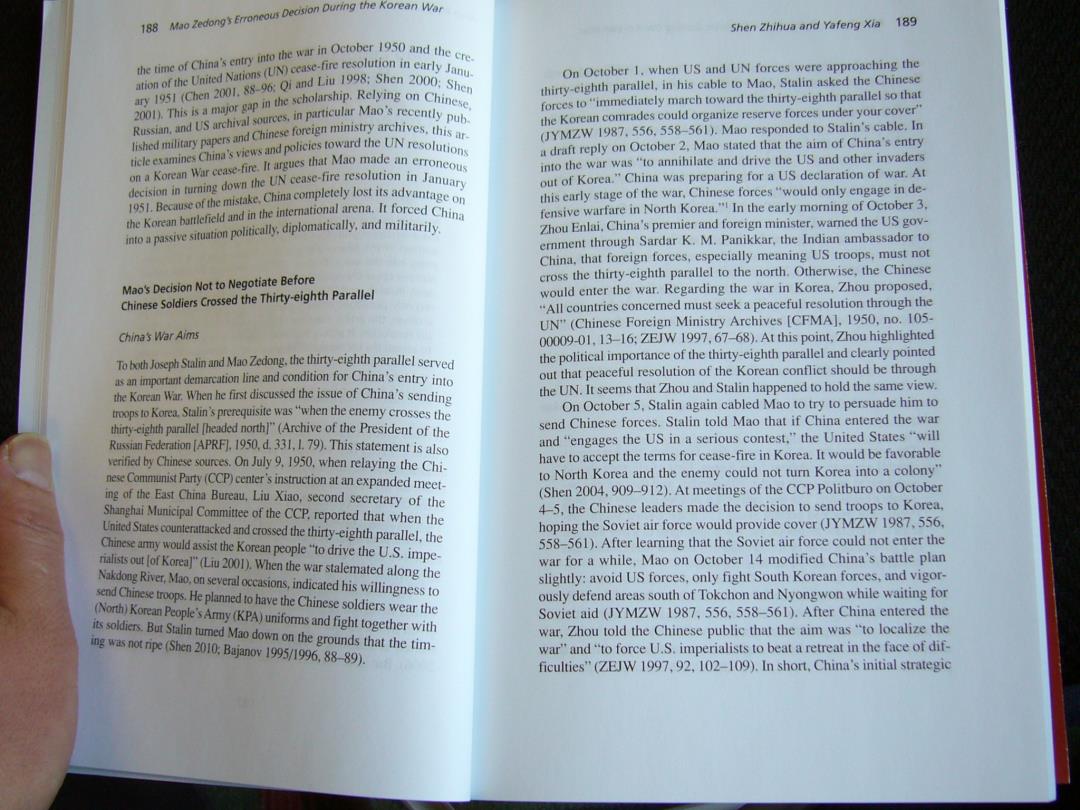
188 Mo edong Erroneous Dedsion rn Shen Zhihua and Yafeng Xia 189 the time of China's entry into the war in October 1950 and the cre. ation of the United Narions (UN)cease-fire resolution in early Janu- On October 1.when US and UN forces were approaching the ry 1951 (Chen 2001.8s-96:Qi and Liu 1998:Shen 2000:Shen 宽hteelyn on Chin thirty-eighth parallel,in his cable to Mao,Stalin asked the Chinese RnatSaaeaerNaoenmwpue forces to"immediately march toward the thirty-eighth parallel so that rand Chneivthr the Korean comrades could organize reserve forces under your cover" (JYMZW 1987.556.558-561).Mao responded to Stalin's cable.In kkemg、vemndpsoWteNeoloio a draft reply on October 2.Mao stated that the aim of China's entry orhao me an erroneous into the war was"to annihilate and drive the US and other invaders e the N anuary out of Korea."China was preparing for a US declaration of war.At teChmost itsnageon this early stage of the war,Chinese forces"would only engage in de- theKndi tenforce Chin fensive warfare in North Korea."In the early moring of October 3. vlliplomtically,and miltarily Zhou Enlai.China's premier and foreign minister,wamed the US gov- ernment through Sardar K.M.Panikkar,the Indian ambassador to China.that foreign forces,especially meaning US troops,must not Mao's Decision Not to Negotiate Before cross the thirty-eighth parallel to the north.Otherwise,the Chinese Chinese Soldiers Crossed the Thirty-eighth Parallel would enter the war.Regarding the war in Korea,Zhou proposed, "All countries concerned must seek a peaceful resolution through the UN"(Chinese Foreign Ministry Archives [CFMA].1950,no.105- Chinas War Aims 00009-01.13-16:ZEJW 1997.67-68).At this point,Zhou highlighted MaoZedonthe thirty-eighth parallel served the political importance of the thirty-eighth parallel and clearly pointed eindndofor China's entryinto out that peaceful resolution of the Korean conflict should be through theKre War.When he first discussed the issue of China's sending the UN.It seems that Zhou and Stalin happened to hold the same view. rStin'sprerqe was"when the enemy crosses the On October 5,Stalin again cabled Mao to try to persuade him to hralle heedt(Archive of the President of the send Chinese forces.Stalin told Mao that if China entered the war us Feration [APRF]90.d.331.1.79).This statement is also and "engages the US in a serious contest,"the United States"will dbyChinese soures On July 9 1950.when relaying the Chi- have to accept the terms for cease-fire in Korea.It would be favorable neseCommunist Party (CCP)center's instruction at an expanded meet- to North Korea and the enemy could not turn Korea into a colony" ing of the East China Bureau.Liu Xiao,second secretary of the (Shen 2004,909-912).At meetings of the CCP Politburo on October Shanghai Municipal Committee of the CCP.reported that when the 4-5,the Chinese leaders made the decision to send troops to Korea, United Sates counrked and crossed the thirty-eighth parallel,the hoping the Soviet air force would provide cover (JYMZW 1987.556. Chinese amy would assist the Korean people"to drive the U.S.impe- 558-561).After learning that the Soviet air force could not enter the rialists out of Korea]"(Liu 2001).When the war stalemated along the war for a while,Mao on October 14 modified China's battle plan Nakdong River,Mao.on several occasions,indicated his willingness to slightly:avoid US forces,only fight South Korean forces,and vigor- send Chinese troops.He planned to have the Chinese soldiers wear the ously defend areas south of Tokchon and Nyongwon while waiting for (North)Korean People's Ammy (KPA)uniforms and fight together with Soviet aid (JYMZW 1987,556.558-561).After China entered the itssoldiers But Stalin tumed Mao down on the grounds that the tim- war,Zhou told the Chinese public that the aim was"to localize the ing was not ripe (Shen 2010.Bajanov 1995/1996.88-89) war"and"to force U.S.imperialists to beat a retreat in the face of dif- ficulties"(ZEJW 1997,92.102-109).In short,China's initial strategic
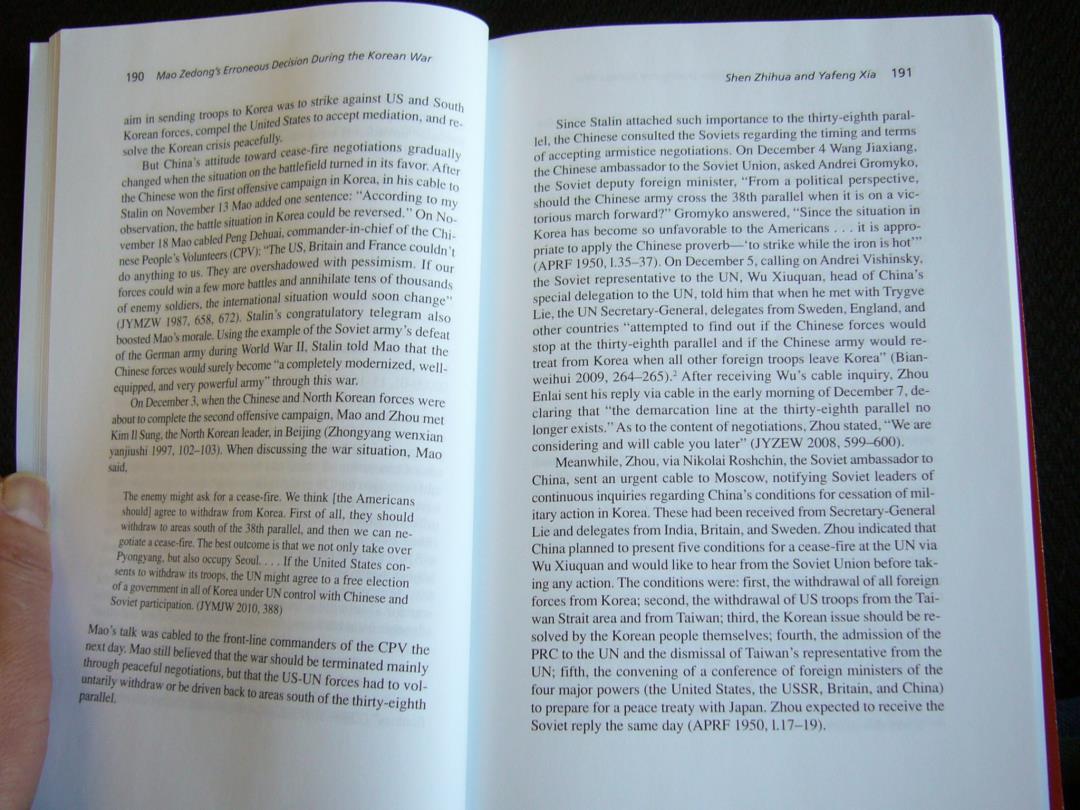
190MaoednnDuring the Korean War Shen Zhihua and Yafeng Xia 191 aim in sending troops to Korea was to strike against US and South ormee t mediion,re Since Stalin attached such importance to the thirty-eighth paral- solve the Korean crisis peacefully. Chinagradually lel,the Chinese consulted the Soviets regarding the timing and terms dhmeahenlhcnaiomomtehatefedRedinisfavorAhe of accepting armistice negotiations.On December 4 Wang Jiaxiang. the Chinese ambassador to the Soviet Union,asked Andrei Gromyko. thehorin his cable to the Soviet deputy foreign minister."From a political perspeetive, S Novmercrin should the Chinese army cross the 38th parallel when it is on a vic- rtaenKore e revrdn No torious march forward?"Gromyko answered,"Since the situation in vemberMP Dun-chiel of the Chi Korea has become so unfavorable to the Americans...it is appro- opleCPVTheU nd Francecou priate to apply the Chinese proverb-'to strike while the iron is hot'" dyTheypesmism Iou (APRF 1950,1.35-37).On December 5.calling on Andrei Vishinsky. rr e nsof thousnd the Soviet representative to the UN.Wu Xiuquan,head of China's ofmthionoudn change special delegation to the UN,told him that when he met with Trygve YMZW197658672).Stalin's congratulatory telegramalso Lie,the UN Secretary-General,delegates from Sweden.England.and nmleofhe Soviet army'defet other countries"attempted to find out if the Chinese forces would ofhedurin World War I.Salinold Mao that the stop at the thirty-eighth parallel and if the Chinese army would re- Chnesecmcompletely modemized,well treat from Korea when all other foreign troops leave Korea"(Bian- equipped,and very powerful army"through this war. weihui 2009,264-265).After receiving Wu's cable inquiry.Zhou o Demt Chinese nd Norh Korean forces were Enlai sent his reply via cable in the early morning of December 7.de- hvecampaign.Mao and Zhou met claring that"the demarcation line at the thirty-eighth parallel no Kmhe North Korean leader.in Beijing (Zhongyang wenxian longer exists."As to the content of negotiations.Zhou stated,"We are y1997.102-103).When discussing the war situation,Mao considering and will cable you later"(JYZEW 2008,599-600). 如过 Meanwhile,Zhou,via Nikolai Roshchin,the Soviet ambassador to China,sent an urgent cable to Moscow,notifying Soviet leaders of The enemy might ask for a cease-fire.We think [the Americans continuous inquiries regarding China's conditions for cessation of mil- houdewithdraw from Korea.First of all,they should itary action in Korea.These had been received from Secretary-General ithrwsouth of the 38th parallel,and then we can ne. Lie and delegates from India,Britain,and Sweden.Zhou indicated that gotiateacfire The best outcome is that we not only take over China planned to present five conditions for a cease-fire at the UN via Pyongyang.but also occupy Seoul....If the United States con- withraw itstoothe UN might agree to a free election Wu Xiuquan and would like to hear from the Soviet Union before tak- of a govemmentnall of Korea under UN control with Chinese and ing any action.The conditions were:first,the withdrawal of all foreign Soviet participation.(JYMJW 2010,388) forces from Korea:second,the withdrawal of US troops from the Tai- wan Strait area and from Taiwan;third,the Korean issue should be re- Mao's talk was cabled to the front-line commanders of the CPV the solved by the Korean people themselves;fourth.the admission of the next day.Mao still believed that the war should be terminated mainly PRC to the UN and the dismissal of Taiwan's representative from the through peaceful negotiations,but that the US-UN forces had to vol- UN:fifth,the convening of a conference of foreign ministers of the niy withdraw or be driven back toareas south of the thirty-eighth parallel four major powers(the United States,the USSR,Britain,and China) to prepare for a peace treaty with Japan.Zhou expected to receive the Soviet reply the same day (APRF 1950.1.17-19)
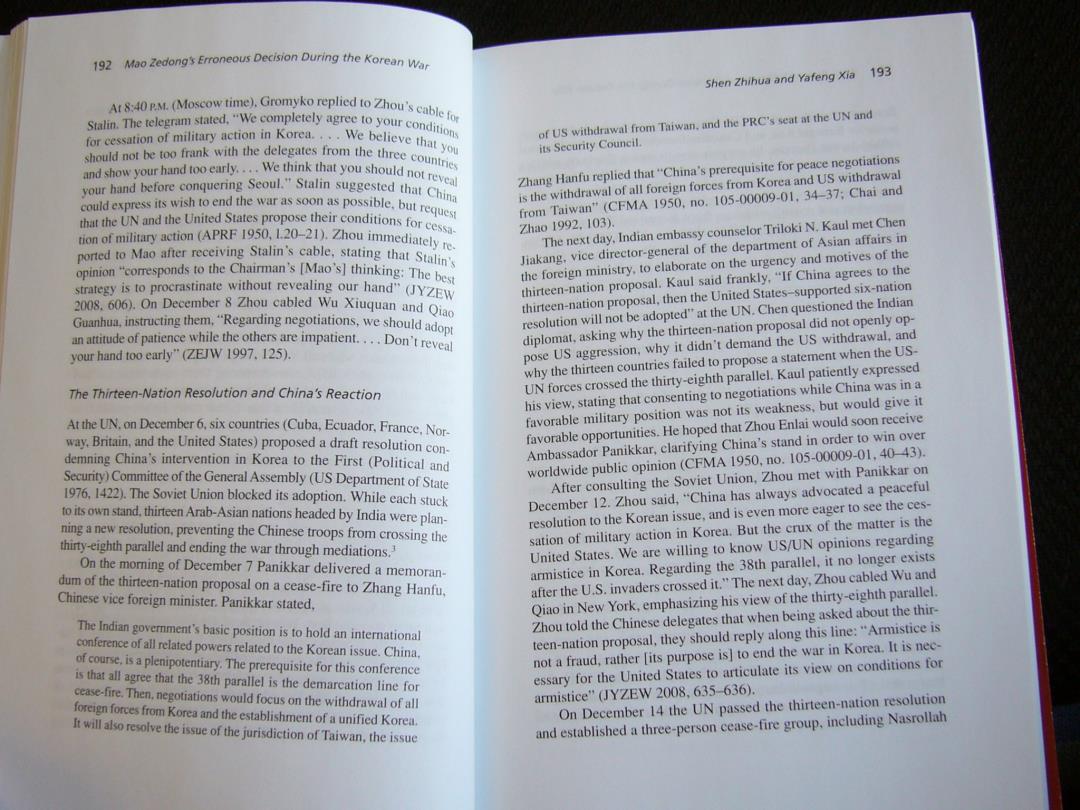
192Mao ednErroneous Decision During the Korean War Shen Zhihua and Yafeng Xia 193 Stalin.The telegram stated,"We completely agree to your condition oo of atinevthat of US withdrawal from Taiwan.and the PRC's seat at the UN and thould not be kh he co its Security Council. yorandWeyouhuotv hnd hereon ouSalined that Chn Zhang Hanfu replied that"China's prerequisite for peace negotiations ouhthepossible butr is the withdrawal of all foreign forces from Korea and US withdrawal haheUNand the Untd propose thercndn for from Taiwan"(CFMA 1950.no.105-00009-01.34-37:Chai and yt(APRF10-1)Zhou immediatelye Zha01992,103). The next day,Indian embassy counselor Triloki N.Kaul met Chen oedoMaoeren Sualin'be stating that Stain Jiakang,vice director-general of the department of Asian affairs in pds to the Chaiman's [Mao's]thinking:The be the foreign ministry,to elaborate on the urgency and motives of the strategy is to procrastinate without revealing our hand"(JYZEW thirteen-nation proposal.Kaul said frankly,"If China agrees to the 200).On December Zhou cabled WuXiuquan and Qiao thirteen-nation proposal,then the United States-supported six-nation Gunructinthem,Regarding ngotiations,we should adop resolution will not be adopted"at the UN.Chen questioned the Indian tde of patience while theothers are impatient..Don't revea diplomat,asking why the thirteen-nation proposal did not openly op- your hand too early"(ZEJW 1997.125). pose US aggression,why it didn't demand the US withdrawal,and why the thirteen countries failed to propose a statement when the US- The Thirteen-Nation Resolution and China's Reaction UN forces crossed the thirty-eighth parallel.Kaul patiently expressed his view,stating that consenting to negotiations while China was in a At the UN.on December6,six countries (Cuba,Ecuador,France.Nor favorable military position was not its weakness,but would give it way.Britain,and the United States)proposed a draft resolution con favorable opportunities.He hoped that Zhou Enlai would soon receive demning China's intervention in Korea to the First (Political and Ambassador Panikkar,clarifying China's stand in order to win over Security)Committee ofthe General Assembly (US Department of State worldwide public opinion(CFMA 1950,no.105-00009-01,40-43). 1976.1422).The Soviet Union blocked its adoption.While each stuck After consulting the Soviet Union,Zhou met with Panikkar on oitsown stand.thirteen Arab-Asian nations headed by India were plan- December 12.Zhou said,"China has always advocated a peaceful ning a new resolution,preventing the Chinese troops from crossing the resolution to the Korean issue,and is even more eager to see the ces- thirty-eighth parallel and ending the war through mediations. sation of military action in Korea.But the crux of the matter is the United States.We are willing to know US/UN opinions regarding On the moming of December 7 Panikkar delivered a memoran- armistice in Korea.Regarding the 38th parallel,it no longer exists dum of the thirteen-nation proposal on a cease-fire to Zhang Hanfu, after the U.S.invaders crossed it."The next day,Zhou cabled Wu and Chinese vice foreign minister.Panikkar stated. Qiao in New York,emphasizing his view of the thirty-eighth parallel. The Indian government's basic position is to hold an international Zhou told the Chinese delegates that when being asked about the thir- conference of all related powers related to the Korean issue.China. teen-nation proposal,they should reply along this line:"Armistice is of course,is a plenipotentiary.The prerequisite for this conference not a fraud,rather [its purpose is]to end the war in Korea.It is nec- is that all agree that the 38th parallel is the demarcation line for essary for the United States to articulate its view on conditions for cease-fire.Then.negotiations would focus on the withdrawal of all armistice"(JYZEW 2008,635-636). foreign forces from Korea and the establishment of a unified Korea. On December 14 the UN passed the thirteen-nation resolution It will also resolve the issue of the jurisdiction of Taiwan,the issue and established a three-person cease-fire group,including Nasrollah
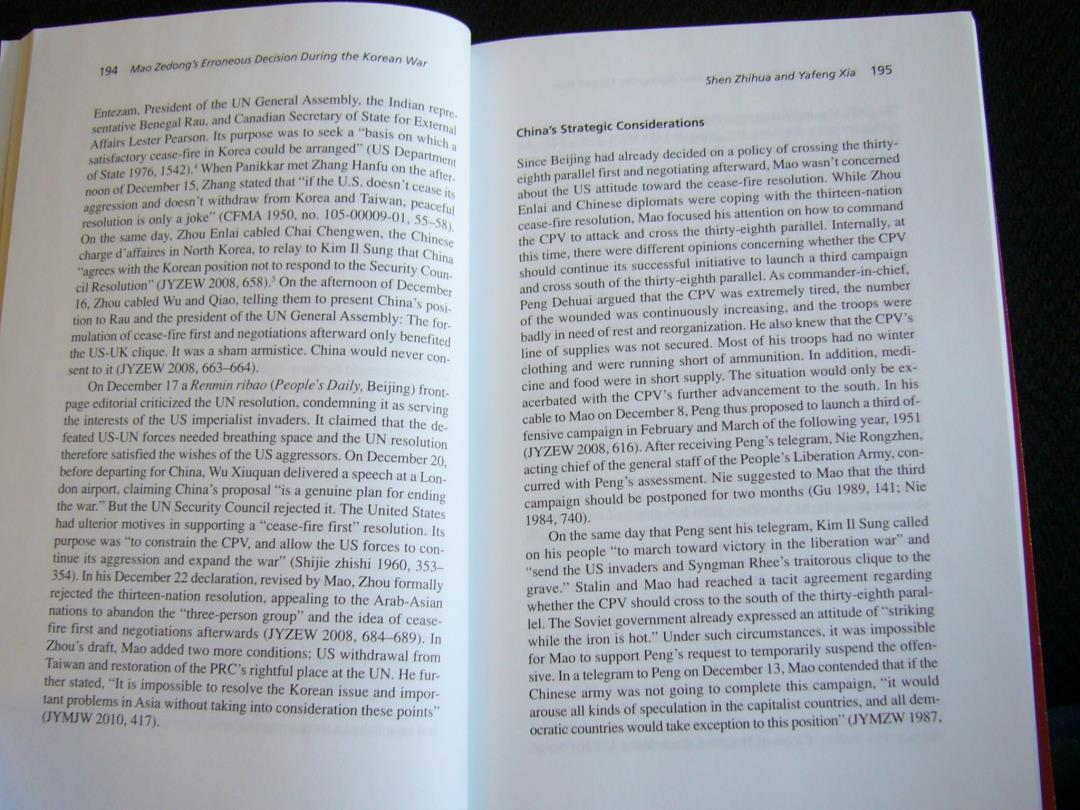
194ring theKorean Wa Shen Zhihua and Yafeng Xia 195 BenegRauo e for Exteme Affairs Lester Pearson.Its purpose was to seek a "basis on which China's Strategic Considerations satisfactory cease-fire in Korea could be arranged (US Departmen of5)When Pan on the Since Beijing had already decided on a policy of crossing the thirty- December hang s tahe oen eighth parallel first and negotiating afterward,Mao wasn't concerned about the US attitude toward the cease-fire resolution.While Zhou egcsionanddoesmLwthtawfeomKoreandTiwanpeacefl ojokeMA50.n01.558 Enlai and Chinese diplomats were coping with the thirteen-nation cease-fire resolution.Mao focused his attention on how to command Onte dayoEnai cbled ChaiChengn the Chine the CPV to attack and cross the thirty-eighth parallel.Internally,at n North Korea.t relay toKmlSung that Chna this time,there were different opinions concerning whether the CPV heKorpoend o the Security Cou should continue its successful initiative to launch a third campaign YZEW08.658)On the aftemoon of December and cross south of the thirty-eighth parallel.As commander-in-chief, 6.Zhou cabled Wu and Qiao,telling them to present China's pos Peng Dehuai argued that the CPV was extremely tired,the number on Rau and the president of the UN General Assembly:The for. of the wounded was continuously increasing,and the troops were mulf fre first and negotitionsafterward only benefited badly in need of rest and reorganization.He also knew that the CPV's the US-UK cliqueIt was a sham armistice.China would never con line of supplies was not secured.Most of his troops had no winter sent to it (JYZEW 2008.663-664). clothing and were running short of ammunition.In addition.medi- On December 17a Renmin ribao (People's Daily,Beijing)front. cine and food were in short supply.The situation would only be ex- paeirriticized the UNresolution.condemning it as serving acerbated with the CPV's further advancement to the south.In his the inerests of the US imperialist invaders.It claimed that the de cable to Mao on December 8.Peng thus proposed to launch a third of- feated US-UN forces needed breathing space and the UN resolution fensive campaign in February and March of the following year,1951 therefore satisfied the wishes of the US aggressors.On December 20. (JYZEW 2008,616).After receiving Peng's telegram,Nie Rongzhen. before departing for China.Wu Xiuquan delivered a speech at a Lon- acting chief of the general staff of the People's Liberation Army.con- don airpor claiming China's proposal"s a genuine plan for ending curred with Peng's assessment.Nie suggested to Mao that the third the war.But the UN Security Council rejected it.The United States campaign should be postponed for two months(Gu 1989.141:Nie had ulterior motives in supporting a"cease-fire first"resolution.Its 1984.740). purpose was"to constrain the CPV,and allow the US forces to con- On the same day that Peng sent his telegram,Kim Il Sung called tinue its aggression and expand the war"(Shijie zhishi 1960.353- on his people "to march toward victory in the liberation war"and 354).In his December 22 declaration.revised by Mao,Zhou formally "send the US invaders and Syngman Rhee's traitorous clique to the rejected the thirteen-nation resolution,appealing to the Arab-Asian grave."Stalin and Mao had reached a tacit agreement regarding nations to abandon the"three-person group"and the idea of cease- whether the CPV should cross to the south of the thirty-eighth paral- fire first and negotiations afterwards (JYZEW 2008.684-689).In lel.The Soviet government already expressed an attitude of"striking Zhou's draft,Mao added two more conditions:US withdrawal from while the iron is hot."Under such circumstances,it was impossible Taiwan and restoration of the PRC's rightful place at the UN.He fur- for Mao to support Peng's request to temporarily suspend the offen- ther stated."It is impossible to resolve the Korean issue and impor- sive.In a telegram to Peng on December 13,Mao contended that if the tant problems in Asia without taking into consideration these points" Chinese army was not going to complete this campaign."it would JYMW2010.417). arouse all kinds of speculation in the capitalist countries,and all dem- ocratic countries would take exception to this position"(JYMZW 1987

196 Eroneou Deion During the Korean War Shen Zhihua and Yafeng Xia 197 741742).Mao insisted on immediately launching a third campaign and cro the thrty parale MoaiednhisteeenmotDecembhcr29.TcsOcaledthin Ministry,13 January 1951,"cited in Cold War International History PnenoconcepnpeCPndAnerhw Project Bullerin 1995/1996.54).China reacted quickly by rebuffing lormakes ie rwhehrrep the UN proposal of"cease-fire first and negotiations afterwards."In rh of the thrty-ighh paralleYMZW his telegram to David Owen.the Acting Secretary-General of the UN on January 17.Zhou Enlai claimed that an initial cease-fire was sim- 733-735.741) hMaefotheCothe thrty- ply designed"o give the US forces a breathing space"and thus was a conspiracy.Zhou's counterproposal,however,consisted of calling parallemmainly fromhiswond for a seven-power conference to be held in China.The PRC,the per- rrrom Pyongyang.The Chinese nd North Kore manent members of the Security Council(the United States,Britain. oedhethird offensive campaign on the last day of 150. the Soviet Union,and France)except for the Republic of China on Theymarhed south across the thirty-eighth parallel and captured Taiwan,plus India and Egypt should participate in the conference, Seou r4.1951.Advanced Chinese and North Korean unts Zhou wrote.The subject matter should include the withdrawal of all ached the thirty-seventh parallel by January 8(Shen and Meng foreign forces from Korea,the removal of American protective power 1988.64Chen2001,92). from Taiwan,and other Far Eastern issues.The PRC's seat at the On the diplomatic front.on January 1.1951.the UN General United Nationsshould be restored on the first day of conference ("Ed- Assembly approved the principles drafted by the cease-fire group.It itorial Note,Chou Enlai to the Acting Secretary-General of the UN" called for ceas-fre throughout Korea,to be supervised by a UN 1951,in US Department of State 1983,91-92:Foot 1990.30:Pei and owith apromise that foreign troops would withdraw grad- Feng1993.25). ally from KoreaA supplementary repor provided that,after a cease On the same day.the Chinese foreign ministry delivered copies fire took effect,the General Assembly would organize a conference of Zhou's telegram to foreign envoys in Beijing,and Zhou received (among the Soviet Union,the United States,the United Kingdom. Indian ambassador Panikkar.The next day.Zhang Hanfu met with dthe PRC)to deal with the Korean War,Taiwan's status,PRC rep- John Hutchison,the British negotiation representative to Beijing.and resentaion a the UN.and other Far Eastern problems.The UN res. Alex Morch,the Danish minister at Beijing.Huan Xiang,director- olution was similar to what Zhou Enlai had proposed on December general of European and African affairs,met with Swedish ambassa- 22.1950.Warren Austin.the US permanent representative to the UN. dor Torsten Hammarstrom,briefing them on China's justification for voted in support of the proposal,which created a storm of outrage rejecting the UN cease-fire resolution.The minutes of these meetings both in the press and in Congress.It locked the Truman administra- further elaborated on China's position and strategies regarding tion in a political dilemma.As Secretary of State Dean Acheson ex- armistice negotiations.China insisted on the principle of"negotia- plained.the Truman administration would lose the Koreans and tions first and cease-fire afterwards."In his meeting with Zhou,Panik- provoke"the fury of the Congress and press"if it chose to support the kar revealed that"the U.S.agreed to the UN resolution,but very proposal,and lose"our majority and support in the United Nations" reluctantly.According to Indian government intelligence,the reason if it did the opposite.The administration made the painful decision to why the U.S.government consented to this resolution is because it support the resolution"in the fervent hope and belief that the Chinese expects that the Chinese government would turn it down."This fur- would reject it"(Acheson 1969,513;Leckie 1996,253-254). ther confirmed the US predicament in handling the UN resolution.It, In retrospect.this resolution should have offered Beijing a very fa- to some extent,allowed the Chinese to understand that the cease-fire vorable opportunity to end the war had it decided to do so.Advised and resolution was not instigated or initiated by the United States.Zhou instructed by Stalin("Ciphered Telegram,Roshchin to USSR Foreign seemed to realize it when he said."Things are not always in the U.S.'s favor'"(CFMA1950.no.113-00068.2645)

19Deon During the KoreanWr Shen Zhihua and Yafeng Xia 199 The Chinese foreign ministry archives also revealed the reason th China decided to reject the UN cease-fire resolution:mainly.Mao wa nor interested in armistice negotiations,at least for the moment.Ale lengthy speech at the UN General Assembly,condemning Zhou SoMa Peng Dhuon the pV Enlai's reply.He said that the UN had explored every possibility for He peneecisn a peaceful settlement and now it was time to take firm action or face euo thehs ofKm Iungn the ruin.He called China the aggressor and urged the UN to immediately Sn)Such nngmby Mao an Peng draft and adopt a resolution condemning China(Shijie zhishi chuban- idhat the Chineshadvupdvncing farthero she 1960.377-381).On January 19,the US House of Representatives Theynorebalenomletely de passed a resolution that called on the UN to declare China an aggres- UNoAfler the thrd campaign.the CPV pary commtee sor.Four days later,the Senate voted in favor of similar action(Gu 1989,197,201:Stueck 1995.155).China's rejection offered Wash- kedorntrregartingtasksdrimecstandrcorganizationonJhanuary8 hesfor the whole paryand amy tover ington a golden opportunity to present its resolution to the UN Gen- eral Assembly condemning China as aggressor,which the United mfcoimprove tactics and sills.When the et cm States tabled in the first committee of the General Assembly on Jan- iwewill aate all enemies and liberate all Kore uary 20(Stueck 1995,154). unshi kexueyuan 2000.192).In his telegram to Peng on January14 Zhou's statement generated harmful effects in many countries. Mao sresed the importance of preparing for"the last battein the India,Canada,and Great Britain were disappointed and requested springinodertofundamentally resolve the issue"in April and May. clarifications from Beijing(Stueck 1995,155).Indian Prime Minis- Mao had wo calculations for the future war:first,confronted by ter Jawaharlal Nehru argued that the Chinese government had not the power of Chinese and North Korean forces.the enemy would completely rejected the UN resolution.Rau spoke at the UN General make some efforts to resist,but would soon retreat from Korea:sec. Assembly,stating that the Chinese government's reply was not an ond.the enemy would put up a tenacious resistance near the areas of outright rejection of the principles established by the three-person Taegu and Pusan.in the middle and south of South Korea.The enemy group.It was"a partial acceptance,a partial rejection,partly re- Mao figured,would retreat from Korea only after it had been beaten questing clarification,and partly counter-proposal."He argued that up.The following day.Mao transmitted this view in a telegram to China's counterproposal"warranted further discussions and negotia- Stalin (APRF 1950.f.45,op.1.d.337,ll.1-3).Since Mao believed tions."Lester Pearson was not so diplomatic,declaring that"Beijing's that the CPV would win a total victory and the US-UN forces would rejection of the UN resolution has closed the avenue for resolution of be forced to abandon Korea,why should the PRC bother to negotiate the Far Eastern problems."Britain,which had been supporting the to end the war so soon?Thus.China insisted on the principle of ne. PRC's admission to the UN,now made it known that it"consents to gotiations first and cease-fire afterward and opposed cease-fire first the denunciation of China's intervention in support of aggressors." and negotiations afterward. although it did not advocate adopting any new measures (CFMA 1950,no.116-00049-02,21-23:Shijie zhishi chubanshe 1960.382- 384.384-388) China's Lost Opportunity To win the support of worldwide public opinion,in the form of re sponding to queries from Panikkar,the Chinese foreign ministry pro- Branded an Aggressor and Forced to Retreat posed an amendment on January 22.It stated that a cease-fire for a limited period could be agreed upon at the first meeting of the Seven- China's rejection of the UN cease-fire resolution was a great relief to Nation Conference and put into effect so that negotiations could pro- the US state department.On January 18 Warren Austin delivered a ceed further;but the terms for cessation of hostilities must be linked to a discussion of political issues and it must guarantee the PRC's seat
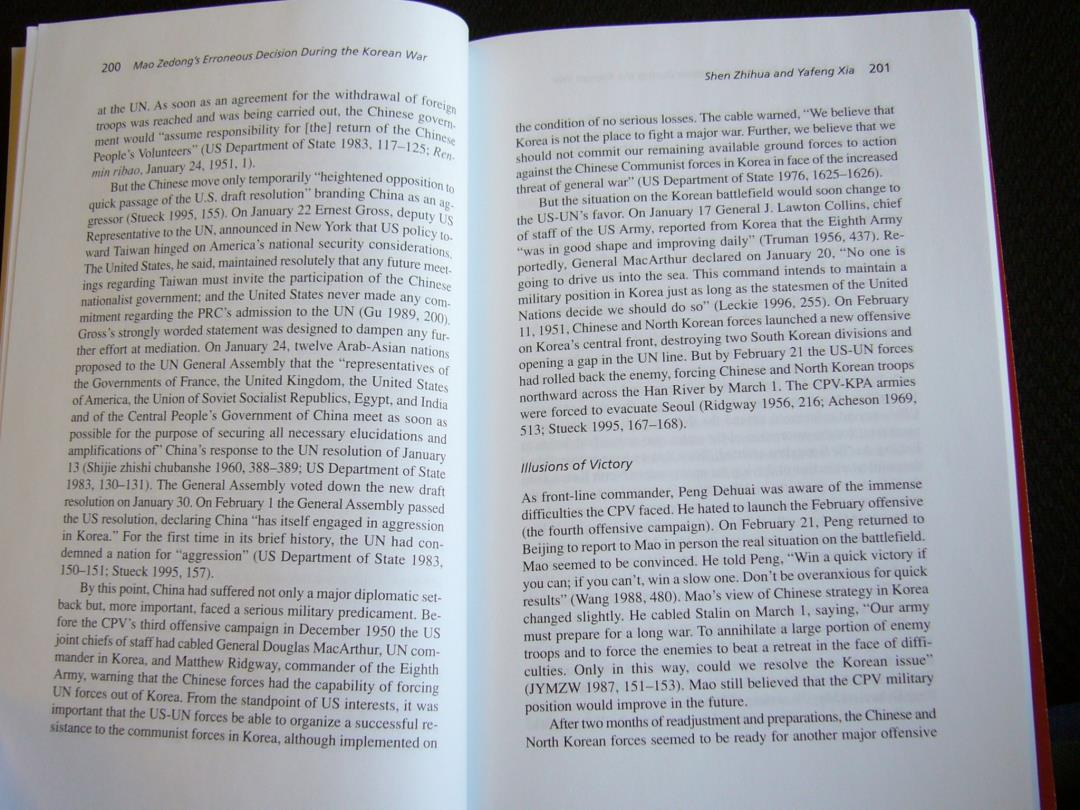
200MDeon During the Korean War Shen Zhihua and Yafeng Xia 201 at the UN.As soon as an agreement for the withdrawal of foreigr troops was reached and was being carried out,the Chinese govem memo heof the Chne the condition of no serious losses.The cable warned,"We believe that volncer Deprment of State 198.117-:Re Korea is not the place to fight a major war.Further,we believe that we should not commit our remaining available ground forces to action min ribao.January 24.1951.1). "BthteCnescmoveomtytenpoatltheigehtenecdopositono against the Chinese Communist forces in Korea in face of the increased threat of general war"(US Department of State 1976.1625-1626). ukof theUrdnChn But the situation on the Korean battlefield would soon change to (5155)On January rdeputy the US-UN's favor.On January 17 General J.Lawton Collins.chief pth UN.nNw York that US poliey of staff of the US Army,reported from Korea that the Eighth Army ThingedoAmeric'sto ity od "was in good shape and improving daily"(Truman 1956.437).Re- The nihednnd tht any future meet portedly.General MacArthur declared on January 20."No one is nrinTwan must invie the participation of the Chinese going to drive us into the sea.This command intends to maintain a ovemn:nd he United States never made any com military position in Korea just as long as the statesmen of the United miment regarding the PRC's admission to the UN(Gu 199200) Nations decide we should do so"(Leckie 1996.255).On February ny worded statement was designed to dampen any fur 11.1951.Chinese and North Korean forces launched a new offensive theformediation.On January 24,twelve Arab-Asian nations on Korea's central front,destroying two South Korean divisions and proped tothe UN General Assembly that the"representativesof opening a gap in the UN line.But by February 21 the US-UN forces theGovemens of France,the United Kingdom,the United States had rolled back the enemy,forcing Chinese and North Korean troops ofAmericathe Union of Soviet Socialist Republics,Egypt,and India northward across the Han River by March 1.The CPV-KPA armies and of the Central People's Government of China meet as soon as were forced to evacuate Seoul(Ridgway 1956.216:Acheson 1969. possible for the purpose of securing all necessary elucidations and 513:Stueck1995,167-168). amplifications ofChina's response to the UN resolution of January 13(Shijie zhishi chubanshe1960.388-89:US Department of State Illusions of Victory 1983.130-131).The General Assembly voted down the new draft resolution on January 30.On February I the General Assembly passed As front-line commander,Peng Dehuai was aware of the immense the US resolution.declaring China"has itself engaged in aggression difficulties the CPV faced.He hated to launch the February offensive in Korea."For the first time in its brief history,the UN had con- (the fourth offensive campaign).On February 21.Peng returned to demned a nation for"aggression"(US Department of State 1983. Beijing to report to Mao in person the real situation on the battlefield. 150-15l:Stueck1995,157). Mao seemed to be convinced.He told Peng,"Win a quick victory if By this point.China had suffered not only a major diplomatic set- you can;if you can't,win a slow one.Don't be overanxious for quick back but.more important,faced a serious military predicament.Be- results"(Wang 1988,480).Mao's view of Chinese strategy in Korea fore the CPV's third offensive campaign in December 1950 the US changed slightly.He cabled Stalin on March 1.saying,"Our army joint chiefs of staff had cabled General Douglas MacArthur,UN com- must prepare for a long war.To annihilate a large portion of enemy mander in Korea.and Matthew Ridgway,commander of the Eighth troops and to force the enemies to beat a retreat in the face of diffi- Army.waming that the Chinese forces had the capability of forcing culties.Only in this way,could we resolve the Korean issue" UN forces out of Korea.From the standpoint of US interests,it was (JYMZW 1987,151-153).Mao still believed that the CPV military important that the US-UN forces be able to organize a successful re- position would improve in the future. sistance to the communist forces in Korea,although implemented on After two months of readjustment and preparations,the Chinese and North Korean forces seemed to be ready for another major offensive

202 n De During the Korean War henn Aprl1order to moblie the Shen Zhihua and Yafeng Xia 203 PV commanders pointed out that"this is the campaign that will mine the fate and length of the Korean War"(Shen and Meng Kim suggested launching an all-out offensive in June or July (APRF 93).But after more than two months of tough battles.the Chinese 1950.f.45.op.1.d.338.11.98-99;"Kim II-sung's letter to Peng De- hKorn forees failed to advance south of the thyee huai,"May 30.1951,in Wang 1998.500).Mao had to invite Kim to allel.On the contrary,the US-UN forces conquered Inchon travel to Beijing on June 3.1951.Mao and Zhou Enlai persuaded Kim Kimpo and marched north across the thirty-eighth parallel.The the barle ine xd to accept"the restoration of the thirty-eighth parallel [as a short-term rmlnheom objective]and phased withdrawal of all foreign troops [from Koreal o eyvemlerof the Rivrby une through negotiations and a political settlement of Korea's future by Shijie zhishi chubanshe 10 peaceful means [as long-term goals]"(Chai and Zhao 1992.115.125: Qi 1991.177:JYMZW 1987,355).Initially against armistice nego- 268.305-358). tiations,North Korea's dependence on the Chinese led Kim to agree The far of he fifthofenivemin demonstraed all the inablity of the tpus the well-quippedN to negotiations based on an armistice along the thirty-eighth parallel (Stueck2002,139).7 off the eninsu (Rees 14.)As Paul Pilla has It was much harder for the Chinese to persuade Stalin.After re- dhn the perceived possiblty of drect cheveme ceiving several cables from Mao and Peng regarding the difficulties ychanges n the rediness of goverments toe in pursuing the war,Stalin replied on June 5 and told the Chinese to (Pillar 6).Beijing evidently expected to settle theco "not rush to end the war."but rather continue"to inflict major blows fictalthouot necessarily to reach a cease-fire alone.Afterhe to the enemy,and annihilate three to four enemy divisions"(APRF CPVsecured a foothold around the thirty-eighth parallel,a peace 1950,f.45,op.1.d.339.11.4-6,10-16,24-25).Mao had to cable Stalin for the restoration of the status quo seemed advisable to again on June 5 and explain to him the extreme difficulties the Chinese Beijing.As Nie Rongzhen asserted."Now that we have accomplished and North Korean forces encountered.He asked Stalin to allow him thepoia objctive of driving the enemy out of North Korea [we] to send Gao Gang,the top leader in Northeast China,and Kim Il Sung houdthe thirty-eighth parallel,[because]restoration of the to Moscow to report on the situation.When Gao and Kim arrived in sttusatebellum would be acceptable to all [governments]that Moscow on June 10,Stalin kept asking them about the real intention areinoed[n the conflict]Most of the military strategists in Bei- and wishes of the Chinese and North Koreans.Only after he heard a jing.Nie recalled later,supported this idea.Mao also concurred.A definite answer that "We want to terminate the war"did Stalin con- policy of"keeping on fighting while negotiating a peace (biantan sent to the policy of armistice negotiations(Shi Zhe 1995.506-508). bianda)"was thus agreed upon by the CCP leadership (Nie 1984. After receiving Stalin's cable on June 13 regarding his consent 742).China's war aim and the method to end war swung back to their to an armistice,Mao asked Gao and Kim to consult with Stalin on initially defined positions. how to propose armistice negotiations.Since the Chinese-North Ko- But both Moscow and Pyongyang still cherished illusions of con- rean armies had lost their advantageous military position on the bat- tinuing the war.In his cable to Mao on May 29.Stalin stated,"It tlefield,it was inconvenient for them to propose an armistice.Mao seems that you are preparing a major offensive.Its purpose is to in- hoped that the Soviet Union would probe and mediate the conflict.As flict heavy loss to the British/American forces."Kim Il Sung wrote to conditions for an armistice,Mao voluntarily asked to drop the issue Peng Dehuai on May 30.stating."Please don't expect to peacefullyre of China's admission to the UN and to use the Taiwan issue only as a sove the Korean issue.We cannot end the war along the 38th parallel." bargaining chip (APRF 1950.f.45,op.1.d.339,11.31-32.57-60). Mao finally came to realize that China had lost its position of strength in negotiations